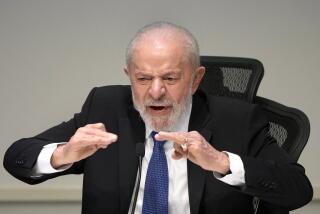Brazil Presidency Won by Reform Candidate : Neves Chosen by Electoral College as Civilian Rule Returns After 21 Years of Military Regimes
BRASILIA, Brazil — Tancredo de Almeida Neves, a moderate reform candidate, was elected president of Brazil on Tuesday, ending 21 years of authoritarian rule by military-dominated governments.
The Electoral College, meeting in the white-marble National Congress building, gave Neves 480 votes, compared to 180 for his opponent, Paulo Maluf, the candidate of the regime’s official Democratic Social Party.
The Electoral College vote was represented by the Neves forces as the last stage in the restoration of full democracy in Brazil. On a huge poster placed outside the Congress building by enthusiastic Neves backers were the words “Good Morning, Democracy.”
When the tally reached the 344 votes necessary to elect Neves, fireworks exploded and church bells rang. In most of the major cities across Brazil, crowds danced and sang the national anthem.
The 344th vote was cast by Deputy Joao Cunha of Sao Paulo, who announced, “I am happy to deliver this blow against the fascist dictatorship that is coming to an end.”
The election of Neves as Brazil’s 38th president marks the return to political dominance of the Brazilian middle class and labor parties, which were ousted when the military seized power in March, 1964, overthrowing President Joao Goulart.
Neves, 74, represents the same political elements that were in power in 1964. Both he and the late President Goulart were political descendants of Getulio Vargas, who created the Brazilian Labor Party and ruled as elected president, and later as dictator, until he committed suicide in office in 1953 rather than resign under military pressure.
Neves is a lawyer from a traditional merchant family in his home state of Minas Gerais. He was minister of justice when Vargas died. Later, he was elected four times to Congress. Under a short-lived parliamentary system, he was prime minister for 11 months in 1962, while Goulart was still president.
Neves, who was elected governor of Minas Gerais in 1982, when the opposition parties showed that they could defeat the pro-government party, is a moderate figure whose candidacy has been accepted without serious opposition by the leaders of the armed forces.
“I come in the name of conciliation,” Neves said in a victory speech before the assembled members of Congress after his election.
President Joao Figueiredo, the latest of five army generals who have ruled since 1964, has announced that he will leave his sickbed and come here today to congratulate Neves, whose term is to run until early 1989.
The political front that delivered the necessary votes in the Electoral College is made up not only of the leading opposition party, the Brazilian Democratic Movement, but also of the centrist alliance led by Vice President Aureliano Chaves, who broke with the Democratic Social Party over the Maluf candidacy.
Neves will probably not announce his Cabinet until he returns from a trip abroad that is expected to include visits to the Vatican for a meeting with Pope John Paul II and to Washington for an informal meeting with President Reagan. The inauguration is scheduled for March 15.
His Cabinet is expected to reflect the broad range of political support that Neves received from both the centrist alliance and his own Democratic Movement, which includes elements further to the left. Neves was supported by some members of the populist Democratic Workers Party of Gov. Leonel Brizola and other minor far-left groups, but he has said that this support does not mean that he will have any Marxists in his government.
In his victory speech, Neves said his top two priorities will be constitutional reform--including restoration of direct, popular election of the president and the mayors of key cities, who have been appointed for the past 15 years--and immediate action against inflation.
In the last year, inflation has raised the Brazilian consumer price index by 223%, with an increase of 12.5% in December alone. The amount of money in circulation increased by 35%, and this could speed up inflation in the next six months unless strong measures are taken to reduce deficit spending and contain the money supply.
“Inflation is the clearest indication of the disorder in the national economy,” Neves said. “We will confront this from the first day.”
He said, however, that this would not be done at the expense of the wage earner.
“We will not commit the gross error of provoking a recession as an instrument against inflation,” he said. “On the contrary, we intend to promote a resumption of growth, stimulating entrepreneurs to invest.”
Brazil, a country of 130 million people, is the largest in Latin America. Although its industrialized economy has grown to one of the world’s 10 largest, there are at least 30 million people here living below minimum nutritional standards.
Neves made no direct reference in his speech to Brazil’s $100-billion foreign debt, which has a $50-billion payment of principal due between now and 1999. The Figueiredo government is negotiating with the International Monetary Fund and with creditor banks for a major restructuring to postpone that payment.
More to Read
Sign up for Essential California
The most important California stories and recommendations in your inbox every morning.
You may occasionally receive promotional content from the Los Angeles Times.










